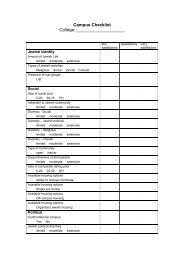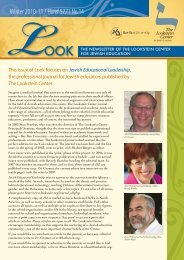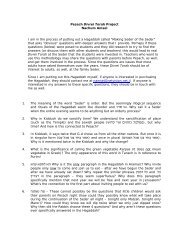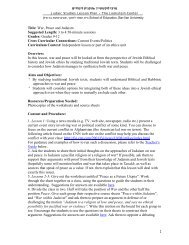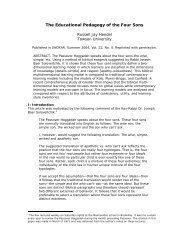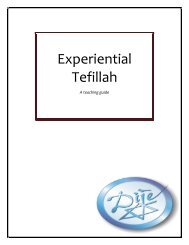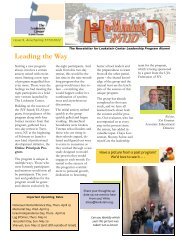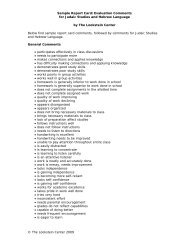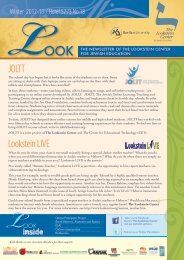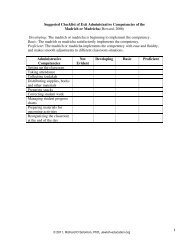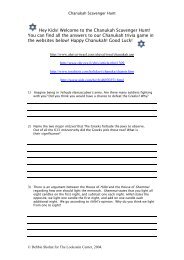FUNDAMENTAL CONCEPTS of the CLASSICAL HEBREW VERB
FUNDAMENTAL CONCEPTS of the CLASSICAL HEBREW VERB
FUNDAMENTAL CONCEPTS of the CLASSICAL HEBREW VERB
Create successful ePaper yourself
Turn your PDF publications into a flip-book with our unique Google optimized e-Paper software.
intended<br />
being about to eat<br />
Passive: present being eaten<br />
perfect<br />
(having been) eaten<br />
intended<br />
about to be eaten<br />
Now only two <strong>of</strong> <strong>the</strong>se are formed in English without auxiliaries, and it is usual in most languages when<br />
o<strong>the</strong>r forms die out for <strong>the</strong>se two to remain: <strong>the</strong> present in <strong>the</strong> active (eating), and <strong>the</strong> perfect in <strong>the</strong> passive<br />
(eaten).<br />
The Hebrew participle has no tense attached to it, so it can be any <strong>of</strong> <strong>the</strong> three, and where this is likely to<br />
cause difficulty <strong>the</strong> participle has to be avoided; but usually <strong>the</strong> active participle is present, and <strong>the</strong> passive<br />
participle is past. This is not necessarily <strong>the</strong> case.<br />
In <strong>the</strong> normal stretch, <strong>the</strong> active (kal) has one participle ( ,(כֹּתֵב and <strong>the</strong> passive has two - one being <strong>the</strong><br />
genuine passive, which has no name, and <strong>of</strong> which only <strong>the</strong> participle remains ( ,(כָּתוּב and <strong>the</strong> o<strong>the</strong>r that <strong>of</strong> <strong>the</strong><br />
middle (nifal) which is used as a passive ( .(נִכְתָּב [The modern tendency to use <strong>the</strong> true passive as a perfect and<br />
<strong>the</strong> nifal form as a present has no basis in Classical grammar.]<br />
There are important cases where <strong>the</strong> tenses are not as stated. For instance we saw how after הִנֵּה <strong>the</strong> active<br />
participle is <strong>the</strong> intended (so-called ‘future’). There are at least two words whose active participle is usually<br />
perfect (‘past’).<br />
One is <strong>the</strong> verb נפל which in <strong>the</strong> normal stretch has three principle meanings: to fall, to desert (to <strong>the</strong> enemy)<br />
and to fall down dead (especially, but not only, in battle). In <strong>the</strong> last meaning, <strong>the</strong> active participle ( (נֹפֵל occurs<br />
quite <strong>of</strong>ten, not as a present (‘falling’) but as a perfect active participle (‘having fallen’). One example is in<br />
Deut. 21:1, but <strong>the</strong>re are many o<strong>the</strong>r examples in later books. It is interesting to note that <strong>the</strong> English perfect (or<br />
past) participle, which is normally passive, is in this case also used as a perfect active - ‘fallen’ meaning ‘having<br />
fallen’. We talk <strong>of</strong> <strong>the</strong> men ‘fallen in battle’.<br />
Ano<strong>the</strong>r word is, surprisingly, <strong>the</strong> verb מוֹת meaning ‘to die’. The participle is .מֵת The expression<br />
הִנֵּה אָנֹכִי מֵת<br />
in accordance with what we have already discussed (as well as common sense) means ‘I am about to die’, i.e.<br />
<strong>the</strong> participle is intended (‘future’). But in o<strong>the</strong>r contexts <strong>the</strong> word is perfect active, meaning ‘having died’ or<br />
‘dead’. It is not a pure adjective meaning ‘dead’, but <strong>the</strong> participle <strong>of</strong> <strong>the</strong> verb used as a past or perfect active<br />
participle. Hence חַי and מֵת are both participles.<br />
[Footnote. English has a passive participle even for verbs that have no passive; in itself this has no meaning,<br />
but is used with <strong>the</strong> auxiliary ‘have’ to form <strong>the</strong> active perfect tense, e.g. from ‘rise’ <strong>the</strong> passive participle is<br />
‘risen’ which produces <strong>the</strong> active perfect tense ‘I have risen’. The perfect active participle is ‘having risen’.]



